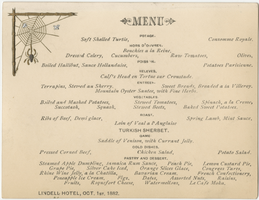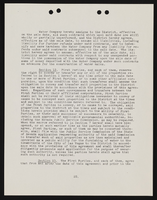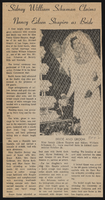Search the Special Collections and Archives Portal
Search Results

Lindell Hotel, menu, October 1, 1882
Date
Archival Collection
Description
Text
Chris Lee oral history interview
Identifier
Abstract
Oral history interview with Chris Lee conducted by Cecelia Winchell and Stefani Evans on December 14, 2021 for Reflections: The Las Vegas Asian American and Pacific Islander Oral History Project.
Judge Chris Lee reflects on the lives of his parents, their occupations and experiences during the Korean War, and his family's decision to immigrate from Incheon, South Korea to Las Vegas. He recalls memories from his childhood visiting family in Korea, Korean traditions and food, his educational pursuits, and the livelihood of his parents after immigrating. Chris also shares details of his employment history as Deputy District Attorney for the Clark County District Attorney’s Office, as Deputy Secretary of State for Southern Nevada, as the first Asian American elected to the Clark County Justice Court bench, and presently as Judge in Department 1 of the North Las Vegas Municipal Court.
Archival Collection
University of Nevada, Las Vegas Arboretum Project Records
Identifier
Abstract
The University of Nevada, Las Vegas Arboretum Project Records are comprised of documents, brochures, and photographs dating from 1976 to 2012 documenting both the creation and operations of the Arboretum at the University of Nevada, Las Vegas (UNLV). The collection includes photographs of planning the Arboretum, the opening ceremony, and aerial photos of the UNLV campus. The brochures include guides to the Arboretum, lists of types of plants grown, and information on the Xeric Garden.
Archival Collection
Fred Houghton Papers
Identifier
Abstract
The Fred Houghton Papers (1909-1998) consist of Houghton’s legal and personal files on his Blue Chip Ranch property in Las Vegas, Nevada. The materials include legal cases, maps, reports, and correspondence concerning water access on the property, and his work with the Las Vegas Well Users Association, which primarily contains correspondence in conjunction with Las Vegas's water politics. The collection also contains court cases during the 1930s when Houghton worked as a lawyer in Chicago, Illinois, as well as legal files for his time as a public defender for the State of California. The personal files in the collection primarily consist of correspondence, banking records, diaries, and notebooks.
Archival Collection
Bruce Turner Collection on Transportation and Water in Southern Nevada
Identifier
Abstract
The Bruce Turner Collection on Transportation and Water in Southern Nevada contains reports, publications, legal files, project proposals, journal articles, financial reports, photographs, and maps concerning transportation policy and water usage in Southern Nevada from 1980 to 2014. The collection contains documents from organizations including the Regional Transportation Commissions of Clark County and Southern Nevada, the Clark County Department of Air Quality and Environmental Management, Clark County Comprehensive Planning, the Urban Land Institute, the City of Las Vegas Neighborhood Services Department, the Southern Nevada Water Authority, and the Las Vegas Valley Water District.
Archival Collection
UNLV Libraries Collection of Hollywood Casino Corporation Promotional Materials and Reports
Identifier
Abstract
The UNLV Libraries Collection of Hollywood Casino Corporation Promotional Materials and Reports includes annual reports, prospectus, 10-K forms, 10-Q forms, equity reports, financial research, press releases, press kits, a stockholder meeting notice, and promotional materials for Hollywood Casino Corporation in Dallas, Texas, dating from 1992 to 2001.
Archival Collection
Alan Copeland Music Scores
Identifier
Abstract
The Alan Copeland Music Scores are original handwritten music scores arranged by American composer Alan Copeland from approximately 1936 to 2004. Copeland worked with various musicians and groups, such as Les Brown, the Modernaires, and Sarah Vaughn.
Archival Collection



